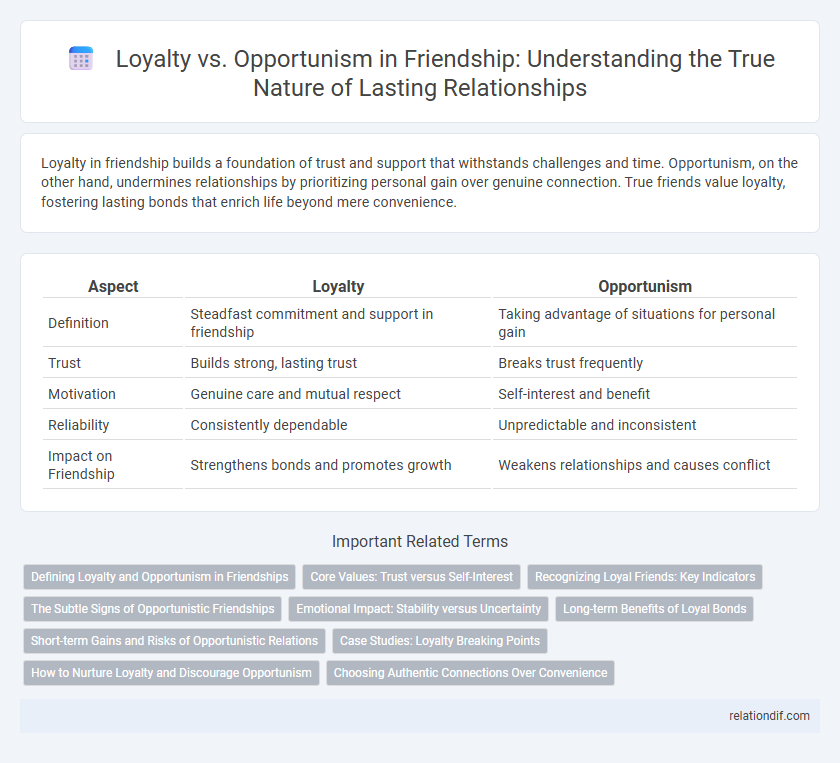Loyalty in friendship builds a foundation of trust and support that withstands challenges and time. Opportunism, on the other hand, undermines relationships by prioritizing personal gain over genuine connection. True friends value loyalty, fostering lasting bonds that enrich life beyond mere convenience.
Table of Comparison
| Aspect | Loyalty | Opportunism |
|---|---|---|
| Definition | Steadfast commitment and support in friendship | Taking advantage of situations for personal gain |
| Trust | Builds strong, lasting trust | Breaks trust frequently |
| Motivation | Genuine care and mutual respect | Self-interest and benefit |
| Reliability | Consistently dependable | Unpredictable and inconsistent |
| Impact on Friendship | Strengthens bonds and promotes growth | Weakens relationships and causes conflict |
Defining Loyalty and Opportunism in Friendships
Loyalty in friendships is characterized by consistent support, trustworthiness, and a commitment to stand by friends through challenges and successes alike. Opportunism involves prioritizing personal gain, often exploiting friendships when advantageous while neglecting genuine emotional bonds. Understanding these contrasting behaviors clarifies the foundation of meaningful and enduring relationships.
Core Values: Trust versus Self-Interest
Loyalty in friendship is rooted in core values like unwavering trust and mutual respect, forging bonds that withstand challenges and time. Opportunism prioritizes self-interest, often undermining trust and leading to superficial relationships based on personal gain. Genuine friendships thrive on loyalty, where trust acts as the foundation for enduring connection and emotional support.
Recognizing Loyal Friends: Key Indicators
Loyal friends consistently demonstrate trustworthiness, support during difficult times, and genuine concern for your well-being, distinguishing them from opportunists who prioritize personal gain. Key indicators include their reliability in keeping promises, willingness to share both joys and challenges, and respect for boundaries without expecting favors in return. Observing consistent behavior over time reveals true loyalty, as opportunistic individuals often show conditional support tied to their interests.
The Subtle Signs of Opportunistic Friendships
Opportunistic friendships often reveal subtle signs such as inconsistent support, where assistance appears only when personal gain is evident, and a tendency to disappear during challenging times. These relationships lack genuine emotional investment, prioritizing self-interest over mutual trust and loyalty. Recognizing patterns of neglect and conditional kindness helps distinguish true loyalty from opportunistic behavior in friendships.
Emotional Impact: Stability versus Uncertainty
Loyalty in friendship fosters emotional stability through consistent support and trust, reinforcing a secure bond that nurtures personal growth and mutual understanding. Opportunism introduces emotional uncertainty by prioritizing self-interest, often causing feelings of betrayal and insecurity that weaken the foundation of the relationship. The emotional impact of choosing loyalty over opportunism shapes the longevity and depth of friendships, highlighting the importance of reliability in cultivating lasting connections.
Long-term Benefits of Loyal Bonds
Loyalty in friendships fosters trust and resilience, creating a stable foundation that withstands challenges over time. Long-term loyal bonds provide consistent emotional support, enhancing mental well-being and mutual growth. Opportunistic relationships often lack depth and sustainability, limiting the potential for meaningful connections and shared success.
Short-term Gains and Risks of Opportunistic Relations
Loyalty in friendship builds trust and long-term support, while opportunism often prioritizes short-term gains that risk damaging relationships. Opportunistic friends may exploit situations for immediate benefits, undermining emotional bonds and causing potential betrayal. Such short-lived alliances can lead to isolation and mistrust, highlighting the value of steadfast loyalty over fleeting advantage.
Case Studies: Loyalty Breaking Points
Loyalty breaking points often emerge in friendships when conflicting interests or external pressures challenge trust, exemplified by case studies where individuals prioritize self-gain over mutual support. Research highlights scenarios in which opportunism undermines long-term bonds, such as business partnerships dissolving after financial incentives tempt one party to betray shared commitments. Understanding these dynamics reveals loyalty's fragile nature and the critical moments that predict relational collapse.
How to Nurture Loyalty and Discourage Opportunism
Fostering loyalty in friendship requires consistent trust-building through honest communication and reliable support during both good and challenging times. Setting clear boundaries and expressing expectations discourages opportunistic behavior by highlighting mutual respect and shared values. Encouraging empathy and recognizing genuine intentions reinforce a resilient bond that prioritizes loyalty over self-interest.
Choosing Authentic Connections Over Convenience
True friendship thrives on loyalty, where trust and genuine support outweigh the allure of opportunism driven by convenience. Authentic connections foster deeper emotional bonds and lasting mutual respect that opportunistic relationships cannot replicate. Prioritizing loyalty in friendships builds a resilient foundation that endures challenges and nurtures personal growth.
Loyalty vs Opportunism Infographic

 relationdif.com
relationdif.com